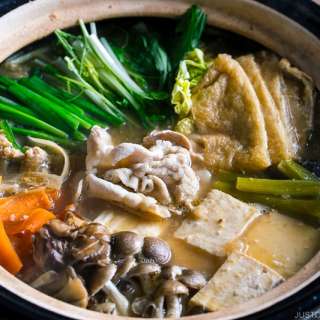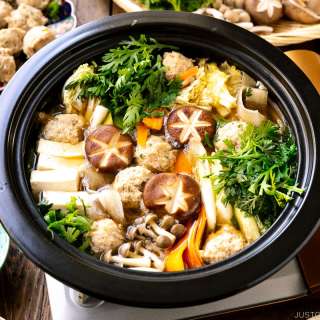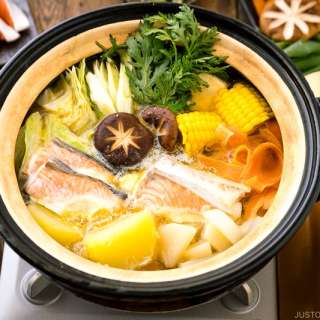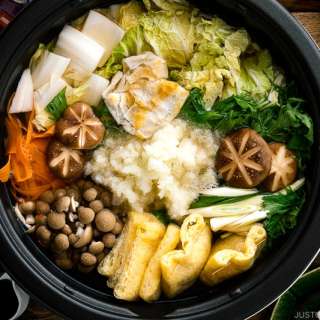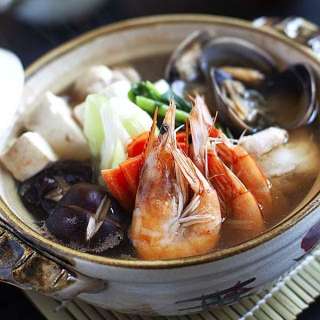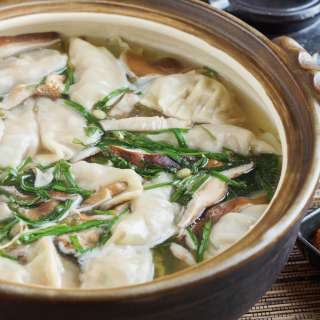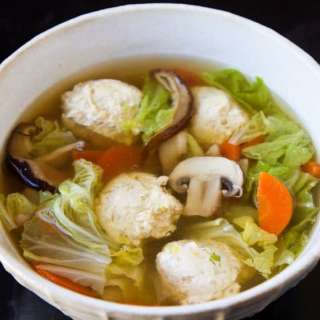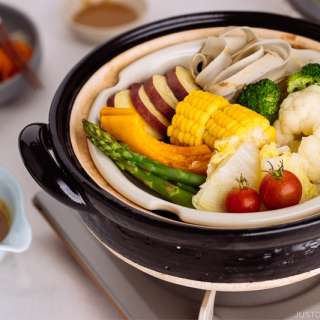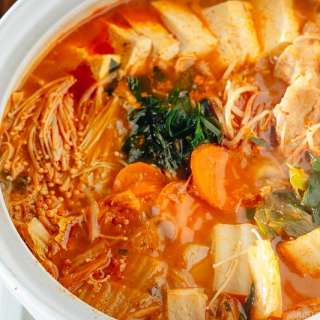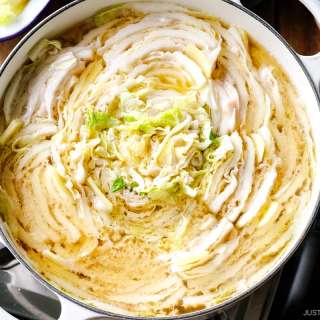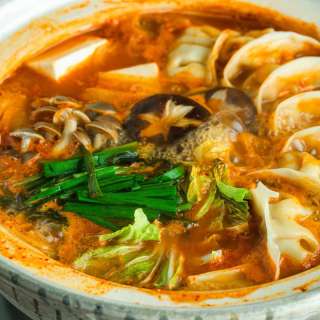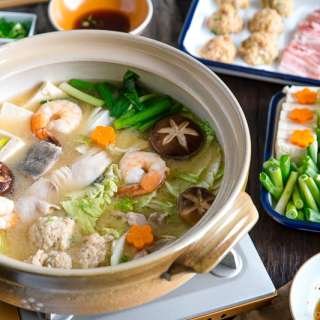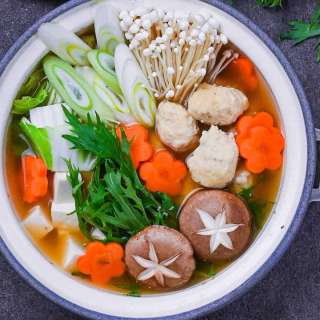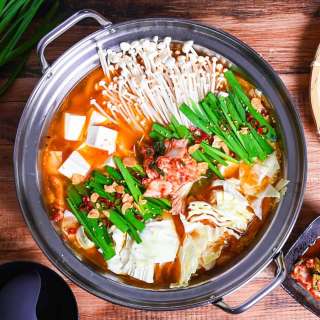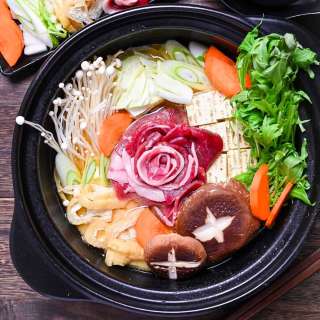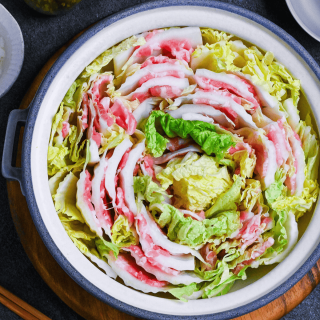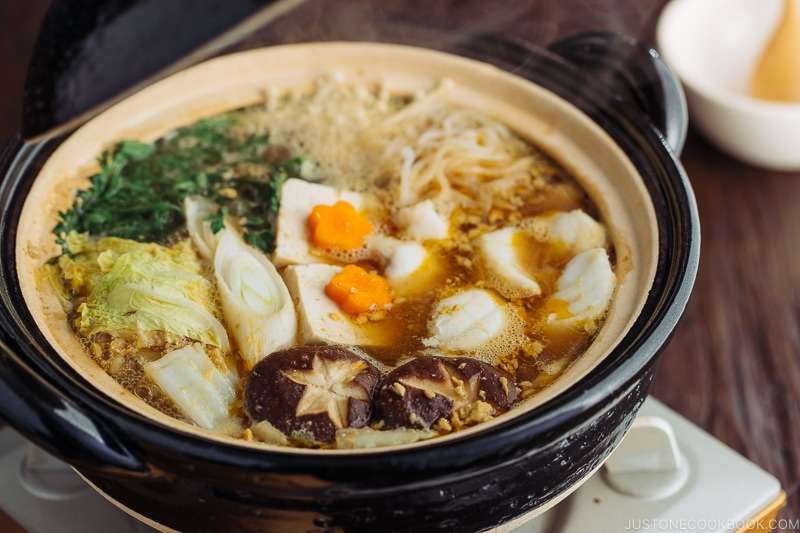
Monkfish Hot Pot (Anko Nabe)
User Reviews
4.7
33 reviews
Excellent
-
Prep Time
20 mins
-
Cook Time
20 mins
-
Total Time
40 mins
-
Servings
4
-
Calories
331 kcal
-
Course
Main Course
-
Cuisine
Japanese

Monkfish Hot Pot (Anko Nabe)
Report
Experience the warmest communal dining at home with this incredibly flavorful Japanese Monkfish Hot Pot called Anko Nabe. The rich soup broth will blow you away. Such a fun way to cook and eat together, it‘s one of our family's favorite meals in the winter months!
Share:
Ingredients
For the Hot Pot
- 1 lb monkfish (anko)
- ¼ lb steamed monk fish liver (ankimo)
- 1 Tokyo negi (naga negi; long green onion) (or several green onions)
- 8 leaves Napa cabbage
- 1 bunch shungiku (chrysanthemum greens) (or any green leafy vegetable)
- 7 oz enoki mushrooms (1 package)
- 3 Shiitake mushrooms
- 1 inch carrot
- 14 oz medium-firm tofu (momen dofu) (1 block)
- 1 package shirataki noodles (7 oz, 198 g)
For the Kombu Dashi (See Notes)
- 4 cups water
- 1 piece kombu (dried kelp) (3 x 4 inches, 7.5 x 10 cm per piece)
For the Seasonings
- 5 Tbsp miso (use red miso or awase miso)
- 4 Tbsp soy sauce
- 4 Tbsp mirin
- 2 Tbsp sake (you can substitute dry sherry or Chinese rice wine)
Instructions
- Gather all the ingredients.
- Make kombu dashi (soup stock) by soaking 1 piece kombu (dried kelp) into 4 cups water. I used kombu dashi this time, but I have made this hot pot with Awase Dashi (kombu + katsuobushi or dried bonito flakes) and they both taste wonderful.
To Prepare the Ingredients
- Cut 1 lb monkfish (anko) into larger bite-size pieces about 1½–2 inches each.
- Cut ¼ lb steamed monk fish liver (ankimo) into ½-inch rounds. If you have raw liver, you will need to steam it for 10 to 20 minutes first.
- Bring a large pot of water to a boil. Once boiling, add the monkfish to blanch for 15 seconds.
- Remove the fish from the pot and immediately transfer into a bowl of iced water. This will remove the fishy smell and help firm up the flesh of the fish. Once chilled, remove from the iced water and set aside.
- Cut 1 Tokyo negi (naga negi; long green onion) diagonally (if you use leek, rinse well to get rid of the dirt between the layers).
- Cut 8 leaves napa cabbage into bite-size pieces.
- Cut 1 bunch shungiku (chrysanthemum greens) into 2-inch pieces. Cut 14 oz medium-firm tofu (momen dofu) into large cubes.
- Discard the bottom part of 7 oz enoki mushrooms and rinse quickly.
- Discard the stem of 3 shiitake mushrooms and add the decorative flower cut on the caps if you wish (see how to cut shiitake hanagiri). Cut 1 inch carrot into rounds and optionally cut into a flower shape (hanagiri).
To Cook the Anko Nabe
- Set a donabe (Japanese earthenware hot pot) over a portable stove at the table. You can also cook in a large pot on your stovetop.
- Add the monkfish liver to the donabe and cook on low heat. As soon as the liver starts releasing oil, use a wooden spatula/ spoon to smash it into a paste or crumble it to resemble the texture of ground meat. It may burn a little bit, but that‘s okay as long as it’s very mildly charred. This adds more flavor.
- Once the liver becomes pasty, add 5 Tbsp miso and combine well. Each miso brand/type has different saltiness and you must taste it to decide if you need to add more (you will need at least 5 Tbsp).
- Gradually add the kombu dashi while mixing the miso mixture to dissolve.
- Add 4 Tbsp mirin, 2 Tbsp sake, and 4 Tbsp soy sauce. Mix well.
- Add the negi (or leek/green onion), bottom tough parts of the napa cabbage, shungiku, 1 package shirataki noodles, enoki mushrooms, and monkfish.
- Let cook a little longer. Then, add in the tofu cubes and shiitake mushrooms.
- Once boiling, add leafy parts of napa cabbage and shungiku. Cover and continue to cook for another 7–10 minutes. Skim off the fat and scum from the surface using a fine-mesh sieve.
To Serve
- Enjoy the hot pot and add more ingredients as you eat. When the broth is reduced, you may need to add more water (or dashi if you have extra).
Nutrition Information
Show Details
Calories
331kcal
(17%)
Carbohydrates
20g
(7%)
Protein
37g
(74%)
Fat
8g
(12%)
Saturated Fat
1g
(5%)
Polyunsaturated Fat
4g
Monounsaturated Fat
2g
Trans Fat
1g
Cholesterol
106mg
(35%)
Sodium
1315mg
(55%)
Potassium
1089mg
(31%)
Fiber
5g
(20%)
Sugar
6g
(12%)
Vitamin A
7240IU
(145%)
Vitamin C
23mg
(26%)
Calcium
257mg
(26%)
Iron
5mg
(28%)
Nutrition Facts
Serving: 4Serving
Amount Per Serving
Calories 331 kcal
% Daily Value*
| Calories | 331kcal | 17% |
| Carbohydrates | 20g | 7% |
| Protein | 37g | 74% |
| Fat | 8g | 12% |
| Saturated Fat | 1g | 5% |
| Polyunsaturated Fat | 4g | 24% |
| Monounsaturated Fat | 2g | 10% |
| Trans Fat | 1g | 50% |
| Cholesterol | 106mg | 35% |
| Sodium | 1315mg | 55% |
| Potassium | 1089mg | 23% |
| Fiber | 5g | 20% |
| Sugar | 6g | 12% |
| Vitamin A | 7240IU | 145% |
| Vitamin C | 23mg | 26% |
| Calcium | 257mg | 26% |
| Iron | 5mg | 28% |
* Percent Daily Values are based on a 2,000 calorie diet.
Genuine Reviews
User Reviews
Overall Rating
4.7
33 reviews
Excellent
Other Recipes
